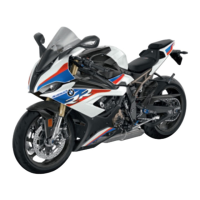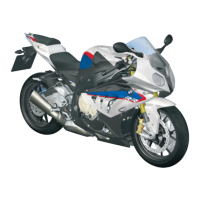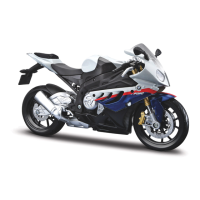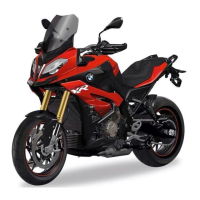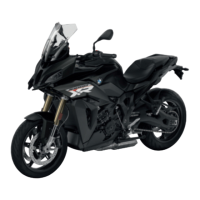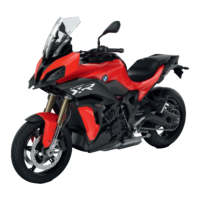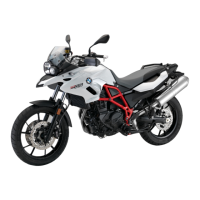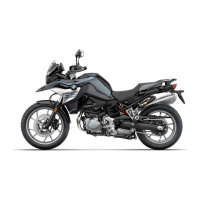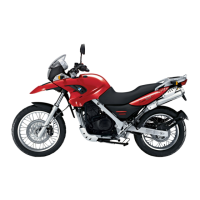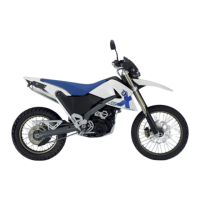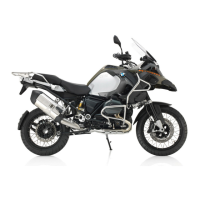Do you have a question about the BMW M 1000 RR 2021 and is the answer not in the manual?
Provides a general overview of the rider's manual's purpose and structure.
Explains common abbreviations and symbols used throughout the manual.
Details optional equipment (OE) and optional accessories (OA) that may be included.
Illustrates and identifies components on the left side of the motorcycle.
Illustrates and identifies components on the right side of the motorcycle.
Shows the location of components stored under the rider's seat.
Details the controls and functions of the left handlebar switchgear.
Details the controls and functions of the right handlebar switchgear.
Explains the layout and indicators on the instrument cluster display.
Lists and explains various indicator and warning lights on the motorcycle.
Describes the information displayed in the Pure Ride view of the TFT instrument cluster.
Details the information displayed in the Menu view of the TFT instrument cluster.
Explains the presentation modes and colours of warning indicators.
Explains how to operate the ignition switch and engage the steering lock.
Describes the function and operation of the emergency-off switch.
Details how to operate the low-beam, high-beam, and parking lights.
Explains how to operate the hazard warning lights system.
Describes the operation of turn indicators and comfort turn indicators.
Explains how to switch the Dynamic Traction Control (DTC) on and off.
Details the different riding modes available and how to select them.
Explains how to set and adjust the adaptive cruise control system.
Describes the display and operation of the Hill Start Control system.
Explains the function and customization of the shift light indicator.
Details the activation, alarm signals, and customization of the anti-theft alarm system.
Explains how to operate the heated handlebar grips.
Describes how to call up and reset the on-board computer functions.
Provides instructions for removing and installing the front and rear seats.
Provides general notes and warnings related to using the TFT display, especially with smartphones.
Explains the basic controls and operating principles of the TFT display.
Describes the Rev. counter and Range display within the Pure Ride view.
Details how to adjust volume, set date, time format, units, and language.
Explains Bluetooth technology, pairing, and possible sources of interference.
Describes the start screen and operating pointers within the My Vehicle menu.
Covers preconditions, entering destinations, and selecting routes for navigation.
Explains how to control music playback and adjust audio settings.
Details how to handle telephone calls, muting, and phone book management.
Information about the display's software version.
Information regarding display licence details.
Instructions on how to adjust the mirrors for optimal viewing.
Details headlight adjustment for different traffic sides and beam throw.
Explains how to adjust the handbrake and clutch levers.
Describes how to adjust the clutch lever play and position.
Details how to adjust the footrest rotor, hinge, and footbrake lever peg.
Explains how to adjust the steering damper for optimal handling.
Guides on adjusting front and rear spring preload based on load conditions.
Covers adjusting compression-stage and rebound-stage damping for front and rear suspensions.
Instructions on adjusting the swinging arm pivot point for chain tension.
Explains how to adjust the motorcycle's riding height using the eccentric strut.
Crucial safety advice for riders, including equipment, loading, speed, and hazards.
Outlines a checklist for regular checks before riding and at refuelling stops.
Step-by-step guide on how to start the engine and perform pre-ride checks.
Recommendations for breaking in the engine and new tyres for optimal performance.
Explains gear shifting, including the Gear Shift Assistant Pro and its safety features.
Describes the function and customization of the shift light indicator.
Comprehensive guide on brake operation, minimizing stopping distance, and emergency braking.
Instructions on how to properly park the motorcycle using the side stand.
Information on recommended fuel grades, usable capacity, and safe refuelling practices.
Guidelines for safely securing the motorcycle for transport.
Explains the sport display modes (Sport 1, 2, 3) and their indicators.
Details how to start, end, and manage lap timing recordings.
Instructions for activating race track configuration and managing connectivity functions.
Explains how to configure and use RACE PRO riding modes for track performance.
Guide on using Launch Control for optimal racing starts and its limitations.
Information on setting and operating the Pit Lane Limiter.
Covers DTC adjustment and adaptation for race conditions.
Recommendations for adjusting chassis and suspension for racing.
Step-by-step guide for removing and installing the motorcycle mirrors.
Instructions for removing and installing the number plate carrier.
Explains how to switch off the ABS function while riding on a race track.
Details on reversing the gearshift pattern for racing use.
Provides general information and links for engineering details.
Explains how the ABS system works, its features, and limitations.
Details the working principles and special situations for the DTC system.
Describes the different riding modes and their impact on engine and chassis settings.
Explains the function and behavior of the Dynamic Brake Control system.
Details the advantages and operation of the Gear Shift Assistant Pro.
Explains the function, requirements, and behavior of the Hill Start Control system.
General notes on maintenance procedures and the use of microencapsulated screws.
Lists the contents of the onboard toolkit and their uses.
Instructions for installing and using the BMW Motorrad front-wheel stand.
Instructions for installing and using the BMW Motorrad rear-wheel stand.
Guide on checking and topping up the engine oil level.
Details on checking brake function, pad thickness, and fluid levels.
Information on checking tyre pressure and tread depth.
Guidance on inspecting wheel rims for defects.
Discusses the effect of wheel size on chassis and suspension control systems.
Explains how to check clutch function and lever play.
Guide on checking and topping up the coolant level.
Instructions for lubricating and caring for the drive chain.
Information on replacing LED light sources.
Steps for removing and installing side panels and tail-hump trim panels.
Safety precautions and procedure for jump-starting the motorcycle.
Maintenance instructions for the battery, including charging and storage.
Instructions on replacing fuses and their assignment.
Steps for engaging and disengaging the diagnostic connector.
General notes on using other-make products and BMW-approved accessories.
Details the plugs for optional accessories and racing accessories.
Information on the USB charging socket's charge current and automatic shutdown.
Details recommended and alternative fuel grades, capacity, and consumption.
Information on engine oil capacity, specification, and topping up procedures.
Details on coolant top-up quantity and specified levels.
Technical specifications for the engine, including displacement and compression ratio.
Technical data for the clutch type and operation.
Information on the type of transmission and gearbox ratios.
Details on the type of final drive and chain deflection.
Information on frame type and identification number location.
Technical data for front and rear suspension types and travel.
Technical specifications for front and rear brakes, pads, and controls.
Details on recommended tyre combinations and speed categories.
Information on fuses and battery specifications.
Technical data regarding the anti-theft alarm system.
Motorcycle dimensions, including length, height, and rider's seat height.
Vehicle weights, including kerb weight and maximum payload.
Key performance figures such as top speed.
Procedures for reporting safety-related defects to authorities and BMW.
Information about the BMW Motorrad service network and finding a retailer.
Explains the importance and entries in the service history booklet.
Overview of BMW Motorrad mobility services available for breakdowns.
Details pre-delivery checks, running-in checks, and general BMW service requirements.
Explains the annual BMW service schedule and its variability.
A detailed schedule of maintenance tasks based on mileage and time intervals.
Lists the tasks included in the BMW Service standard scope for confirmation.
A table for recording service work, odometer readings, and dates.
| Displacement | 999 cc |
|---|---|
| Engine Type | 4-stroke, 4-cylinder in-line |
| Max Power | 212 hp |
| Max Torque | 113 Nm |
| Transmission | 6-speed |
| Frame | Aluminum bridge frame |
| Front Brake | Double disc brake, 320 mm |
| Rear Brake | Single disc brake, 220 mm |
| ABS | BMW Motorrad Race ABS |
| Traction Control | DTC (Dynamic Traction Control) |
| Wet Weight | 192 kg |
| Fuel Capacity | 16.5 liters |
| Top Speed | 306 km/h |
